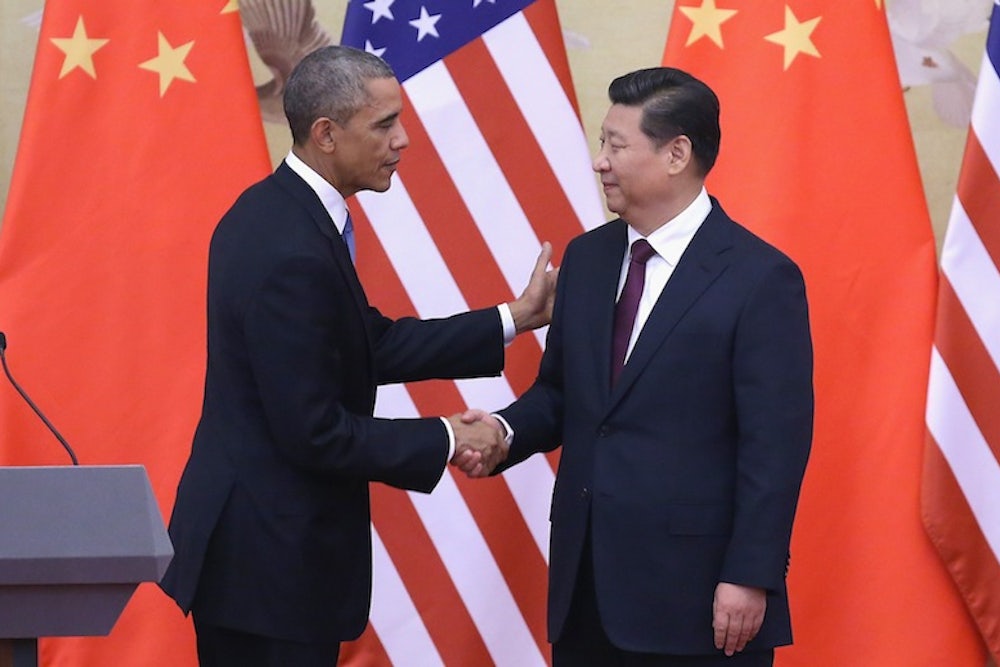President Barack Obama and Chinese President Xi Jinping announced on Wednesday commitments to reduce both countries’ greenhouse gas emissions. The surprise announcement, which came while Obama visits Beijing this week, is the clearest sign yet the two countries are serious on climate change.
After months of negotiations with China, Obama has pledged the U.S. to cut emissions between 26 and 28 percent below 2005 levels by 2025. This is double the pace of carbon cuts the U.S had already pledged to reach by 2020.
But China’s commitments might be even more unexpected, because it is the first time the growing economy has committed to a year for capping its emissions—seen as a crucial step for avoiding the worst-case scenarios of global warming. Xi pledged this will happen around 2030, though it will try to reach this peak as early as possible. China also agreed to increase the share of energy that doesn’t come from fossil fuels to 20 percent by 2030.
Together, the U.S. and China are responsible for 45 percent of global emissions. For that reason alone, they are the most closely watched countries in the year before climate change negotiators convene in Paris to set post-2020 goals that finally slow carbon pollution.
Here’s why the rest of the world will take note:
China is serious about climate change.
China had already signaled it would tackle air pollution and greenhouse gas emissions, with initiatives like launching a national market for trading carbon permits and promising to make Beijing coal-free by 2020. Experts like Jake Schmidt, director of the International Program at the Natural Resources Defense Council, just weren’t sure how much it was ready to commit to. “A couple of years ago, if anybody had said that China will have its C02 peak in 2030, it would have sounded unrealistic,” Schmidt said in an interview. “Most analysts back then were talking about 2040 or much later.”
Republicans have long used China’s growing emissions as a reason why the U.S. should do nothing. For instance, Senator Marco Rubio argued in 2013 that as “a country, not a planet,” U.S. action would have “a very negligible impact on the environment […] China, India, and others — they’re now the largest polluters in the world by far.” (A Climate Desk video compiles more of these excuses). China could just as easily point out that the U.S. was not doing enough as the world’s biggest polluter historically. This deal undercuts a favorite Republican excuse for sitting out of a global climate change agreement.
Obama has more planned.
Obama’s target would double the average pace of carbon cuts from 2005 to 2020, now at 1.2 percent per year, to 2.8 percent. According to the White House, the 26-28 percent cuts can be done under existing law. But the reality is that reaching these cuts requires commitment from both this White House, and the next one. Of course, this is assuming that the Environmental Protection Agency’s proposals to cap power plant emissions remain intact, despite Republican opposition. There are at least two sectors these cuts could come from: the transportation sector, which hasn’t seen demand rise since 2005, and in the power sector, by strengthening the EPA's plan for carbon cuts from coal-fired power plants and increasing renewable energy.
Both countries have a lot of work ahead to get to these targets.
The administration says this will be achievable under existing law. It assumes the Environmental Protection Agency’s regulations to slash carbon pollution from power plants 30 percent by 2030 are in full swing. But there is also intense Republican opposition to the EPA’s plans, and to Obama’s. The new Congress is led by climate change deniers, who will obstruct the president’s plans. The next Senate Majority Leader, Mitch McConnell, has suggested he will use must-pass appropriations bills as leverage to force Obama into delaying or weakening his own climate regulations.
Xi may not have to deal with Congress, but China has its own challenges ahead. The next step to watch for is specific regulations and goals that are outlined in China’s next five-year plan. It won’t be easy to meet these pledges: Non-fossil fuels made up 9.8 percent of China’s energy sources energy in 2013. To achieve 20 percent of its energy from non-fossil fuels, China will need to add clean and nuclear energy at an enormous scale. It would need to install generating capacity that almost equal the total electricity generating capacity of the U.S. Right now, according to the Washington Post, China “completes a new coal plant every eight to 10 days."
There’s even more to do.
This probably isn’t enough to reach the drastic cuts scientists say are needed to limit rising global temperatures to 2 degrees Celsius—the level of warming policymakers say is acceptable. Other countries will announce their own intended targets through the first few months of next year, and from there, negotiators and activists hope to pressure countries to commit to even more. “The U.S. and China should make it a race to the top, catalyzing other countries to announce their targets and build momentum leading up to Paris,” World Resources Institute Climate Program Director Jennifer Morgan said in a statement. Europe has already announced a target of at least 40 percent cuts over 1990 levels by 2030. Will India, another major polluter, be next?
This deal may only be a start to a year of climate change negotiations, but it’s certainly a good sign, says Schmidt.
“It’s the agreement that people have been waiting for, for a long time. It’s the two biggest emitters, the two largest economies, the two biggest drags on agreement over the years. For them to step up and say we’re going to take deep actions, it will send a powerful signal to countries around the word."
